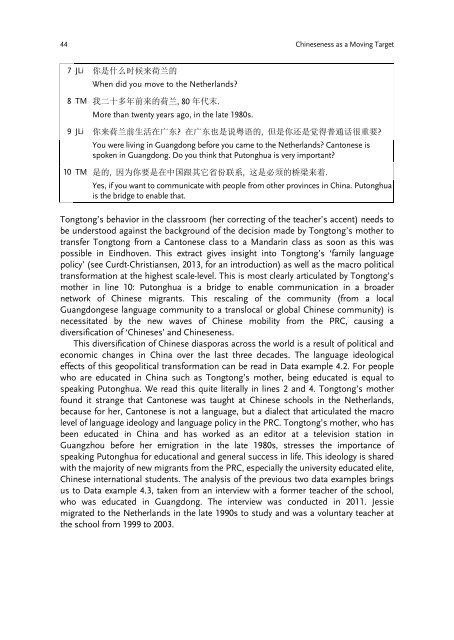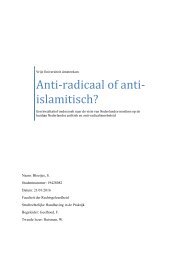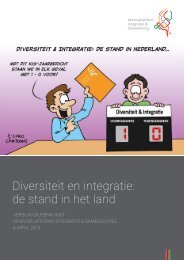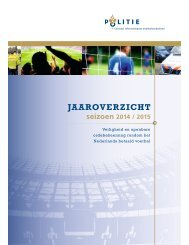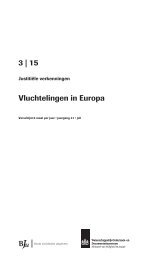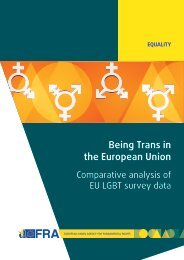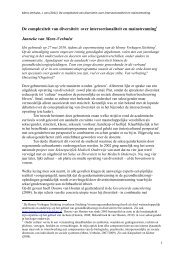Tilburg University Chineseness as a Moving Target Li Jinling
Li_Chineseness_12_09_2016
Li_Chineseness_12_09_2016
Create successful ePaper yourself
Turn your PDF publications into a flip-book with our unique Google optimized e-Paper software.
44 <strong>Chineseness</strong> <strong>as</strong> a <strong>Moving</strong> <strong>Target</strong><br />
7 J<strong>Li</strong> 你 是 什 么 时 候 来 荷 兰兰 的<br />
When did you move to the Netherlands?<br />
8 TM 我 二 十 多 年 前 来 的 荷 兰兰 , 80 年 代 末 .<br />
More than twenty years ago, in the late 1980s.<br />
9 J<strong>Li</strong> 你 来 荷 兰兰 前 生 活 在 广 东 ? 在 广 东 也 是 说 粤 语 的 , 但 是 你 还 是 觉 得 普 通 话 很 重 要 ?<br />
You were living in Guangdong before you came to the Netherlands? Cantonese is<br />
spoken in Guangdong. Do you think that Putonghua is very important?<br />
10 TM 是 的 , 因 为 你 要 是 在 中 国 跟 其其 它 省 份 联 系 , 这 是 必 须 的 桥 梁 来 着 .<br />
Yes, if you want to communicate with people from other provinces in China. Putonghua<br />
is the bridge to enable that.<br />
Tongtong’s behavior in the cl<strong>as</strong>sroom (her correcting of the teacher’s accent) needs to<br />
be understood against the background of the decision made by Tongtong’s mother to<br />
transfer Tongtong from a Cantonese cl<strong>as</strong>s to a Mandarin cl<strong>as</strong>s <strong>as</strong> soon <strong>as</strong> this w<strong>as</strong><br />
possible in Eindhoven. This extract gives insight into Tongtong’s ‘family language<br />
policy’ (see Curdt-Christiansen, 2013, for an introduction) <strong>as</strong> well <strong>as</strong> the macro political<br />
transformation at the highest scale-level. This is most clearly articulated by Tongtong’s<br />
mother in line 10: Putonghua is a bridge to enable communication in a broader<br />
network of Chinese migrants. This rescaling of the community (from a local<br />
Guangdongese language community to a translocal or global Chinese community) is<br />
necessitated by the new waves of Chinese mobility from the PRC, causing a<br />
diversification of ‘Chineses’ and <strong>Chineseness</strong>.<br />
This diversification of Chinese di<strong>as</strong>por<strong>as</strong> across the world is a result of political and<br />
economic changes in China over the l<strong>as</strong>t three decades. The language ideological<br />
effects of this geopolitical transformation can be read in Data example 4.2. For people<br />
who are educated in China such <strong>as</strong> Tongtong’s mother, being educated is equal to<br />
speaking Putonghua. We read this quite literally in lines 2 and 4. Tongtong’s mother<br />
found it strange that Cantonese w<strong>as</strong> taught at Chinese schools in the Netherlands,<br />
because for her, Cantonese is not a language, but a dialect that articulated the macro<br />
level of language ideology and language policy in the PRC. Tongtong’s mother, who h<strong>as</strong><br />
been educated in China and h<strong>as</strong> worked <strong>as</strong> an editor at a television station in<br />
Guangzhou before her emigration in the late 1980s, stresses the importance of<br />
speaking Putonghua for educational and general success in life. This ideology is shared<br />
with the majority of new migrants from the PRC, especially the university educated elite,<br />
Chinese international students. The analysis of the previous two data examples brings<br />
us to Data example 4.3, taken from an interview with a former teacher of the school,<br />
who w<strong>as</strong> educated in Guangdong. The interview w<strong>as</strong> conducted in 2011. Jessie<br />
migrated to the Netherlands in the late 1990s to study and w<strong>as</strong> a voluntary teacher at<br />
the school from 1999 to 2003.


